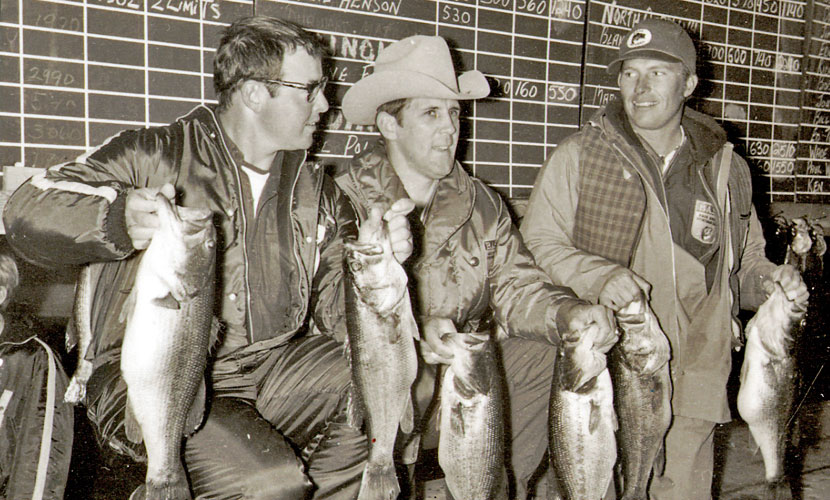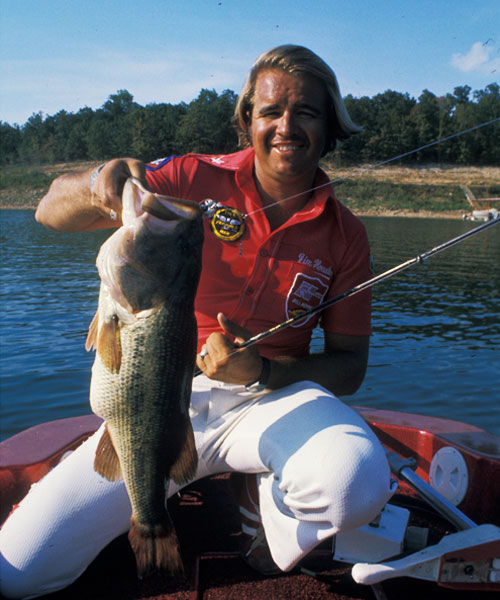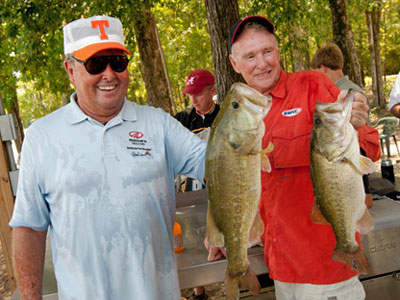
Far from being fossils, the early rock stars of bass fishing, Roland Martin, Bill Dance, and Jimmy Houston, continue to gather no moss. They just keep on rolling.
They dominated the first decade of B.A.S.S., winning all 10 Angler of the Year awards in the 1970s. Each has been a staple on TV for decades and all have been inducted in multiple fishing halls of fame. The latest gig for the septuagenarians is teaming up for a line of fishing products under “Th3Legends” name.
If anyone can use “legend,” it is these three. Their credentials and lofty positions in the fishing world are undeniable, and they remain positively active. At their buzzing ICAST booth, after an appearance where fans young and old lined up to get their autographs and pose for photos, each was asked their greatest achievements in the sport.
“I got a couple legacies,” Martin said. “My son following in my footsteps is one legacy. (Scott Martin just won the FLW Angler of the Year.) The fact that I’ve had a television show for 40 years is another legacy.
“I have some records still on the board. I’m proud of myself and some of the things I’ve come up with, some patterns and lure techniques and some things that I’m known for, things I feel pretty good about.”
Martin holds the record with nine AOY titles, and the only missing link in his incredible resume is winning a Bassmaster Classic. But he holds out hopes he can qualify for his 26th Classic via the Opens … giving him the potential to check that off.
“We all had our eyes on some of these big tournaments, like I never had won the Classic,” Martin said. “I don’t know if that’s going to be reality or not, even at 75 years old. I still have one last-ditch effort to try to make it.
“It doesn’t have to happen. It’s neat to have ambition and goals. I’d like to climb Mt. Everest. I know that’s not possible, but I’d like to do it.”
 Houston, known as “America’s Favorite Fisherman,” has said he never planned to become a bass fishing “pro,” but was proud of his two AOYs, especially since he called the first, a la Babe Ruth.
Houston, known as “America’s Favorite Fisherman,” has said he never planned to become a bass fishing “pro,” but was proud of his two AOYs, especially since he called the first, a la Babe Ruth.
“I never really set goals in bass fishing at all over the years,” Houston said. “The only goal I probably ever really had was back when I started and fished all the tournaments for the first time.”
Houston fished his first event with B.A.S.S. in 1968, but didn’t compete full-time until 1975, when he finished third in the AOY standings behind Martin and Ricky Green.
“I certainly was not trying to win angler of the year. I mean, I probably felt like Roland wins it every year, it didn’t matter,” said Houston, known for kissing his fish. “But I finished third and I remember telling Ray Scott that I’m going to win the Angler of the Year title next year. Ray kind of laughed …
 “And I did win Angler of the Year in 1976. That was only the real goal I’ve ever set in bass fishing tournaments. I actually won it again another time, but I really didn’t intend to that year.”
“And I did win Angler of the Year in 1976. That was only the real goal I’ve ever set in bass fishing tournaments. I actually won it again another time, but I really didn’t intend to that year.”
That was in 1986, a year after Martin’s record ninth AOY and six years after Dance retired from competitive bass fishing. Dance took the inaugural AOY title in 1970 and also held the award in 1974 and 1977. Those titles pale to his most valued experiences fishing.
“There’s been a lot of them, from winning tournaments to special awards,” Dance said, “but the most cherished moments in my bass fishing career were watching each one of my children catch their very first fish … and then being able to see each one of my grandchildren catch their very first fish. Those had to be the greatest moments in my fishing career.”
All three feel blessed to make their mark in an activity they love and are passionate about, and their relationships with each other as well as others in the industry ranks high. Dance, who was selling furniture before fishing, well summated how each of the legends must feel.
“I’ve been very, very fortunate,” he said. “I’ve accomplished a lot of things in life I’ve never dreamed I’d be able to. I’ve been on all four corners of this industry, from being able to manufacture baits — being an owner of Strike King Lure Co. back in the early days — sell the baits, use the baits, promote the baits … and be on national TV, radio, newspapers, writing articles for national magazines.

“Being able to be on television and being able to tell America each week about this great sport, being able to show America how to fish and to share with Americans how great this sport is. If I never catch another fish, just being able to do this and to accomplish what I’ve been able to do and share this with America has just been a great, great thing.”
One thing the legends do is appreciate their fans. They’re absolutely gracious with their time. At ICAST, they spent any free time interacting with fans. Houston was observed entertaining a group he just met. He treated them like longtime buddies, chatting about the latest viral Internet videos, sharing his stories and listening to theirs.
Houston, who left work as an insurance agent before fishing took over his life, enjoys all outdoors. The Oklahoman is big into hunting, especially deer. He’s proud of his career, and that includes his recent competitive fishing exploits.
“I qualified for the FLW Championship (2013) — the oldest guy to ever qualify,” Houston said. “I know that Roland is trying to become the oldest guy that’s ever qualified for a Bassmaster Classic. I consider that, being the oldest guy to ever qualify for an FLW Championship, as a pretty great accomplishment.”
Houston said he’ll fish his Quaker State boat next year, hanging on the hope of reaching another title event, or maybe even two.
“If I had a goal right now, it’d be nice to qualify for another (FLW) Championship or the Bassmaster Classic,” he said. “I like the idea of win and you’re in. I think that’s the greatest thing that Jerry (McKinnis) ever did, to bring that back. Even in old age, you might win … and you’re in.”
It’s amazing these three continue to keep such hectic schedules. Houston, the youngest, turned 71 in July. Dance turned 75 on Oct. 7 and Martin is seven months his senior.
Since each has done so much in the sport, their legendary status is set in stone, but Martin got philosophical on what that might mean in the distant future.
“In talking about 10 generations from now, maybe it’s not very important, but for this one or two generations right now, I’m still known,” he said. “I’m still a big enough figure in the fishing world where I still have a legacy.
“I wonder how long those last? I don’t know. I wonder how many generations down the road will we be forgotten. It’s a good question.”


